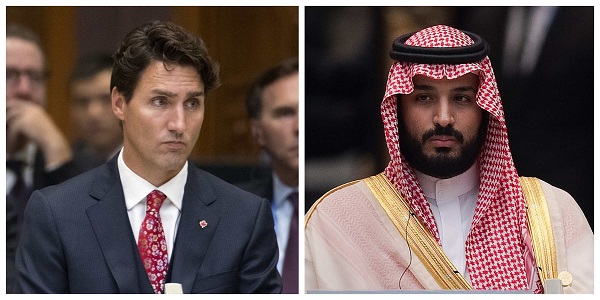Alwaght- Over the past three days, the diplomatic tensions between Saudi Arabia and Canada have been making the world media headlines. The crisis started when Canada’s foreign ministry issued a statement in which it lashed out at Riyadh for the detention of the women rights activists and called on the regime immediately released them. Shortly after, the Canadian Foreign Minister Chrystia Freeland in a Twitter post blasted detention of Samar Badawi and Nassima al-Sadah, two Saudi women rights activists. Canada’s statements were strongly responded to by the Saudi regime which fast announced the suspension of diplomatic relations with Ottawa.
The Saudi foreign ministry issued a statement calling the Canadian ambassador to Riyadh as “persona non grata”, asking him to leave the kingdom within 48 hours. Moreover, it froze the trade and investment cooperation with Canada. The statement, furthermore, blasted Canada for what it called interference in Saudi home affairs, warning that Riyadh reserved the right to take further actions against Ottawa. The statement red that any other meddling in the kingdom’s domestic affairs will give Saudi Arabia the right to do the same with Canadian home affairs.
The strong-toned Saudi statement received a calm response from Canada. The Canadian foreign ministry spokeswoman Marie-Pier Baril in reaction to Saudi expelling of her country’s ambassador said that Ottawa will keep contacts with Saudi Arabia.
The fiery response of the Saudis comes while the Arab monarchy is one of the biggest markets for the Canadian products. In 2016, for example, nearly 45 percent of the Canadian exports to the kingdom included tanks, armored vehicles, and other military equipment. At the same time, 98 percent of Canada’s imports from Saudi Arabia included oil and mineral products. Additionally, since 2016, Saudi Arabia invested about $6 billion in Canada. Since early this year, the reports suggest that Canada exported to Saudi Arabia $1.4 billion worth of goods and services. Its imports at the same time have been about $2 billion. Despite this huge volume of trade relations, why did Saudi Arabia suspend relations with Canada? And what does this spat make clear?
Taking independent gesture to dismiss servility labeling
The main reason that pushed Saudi Arabia to all of a sudden suspend diplomatic, economic, and educational relations with Canada is a will to save face amid accusations that the kingdom is increasingly being recognized by the Muslim and Arab world as a puppet regime to the West. Over the past few years, Iran and to some degree Turkey took strong stances against any intervention in their home affairs by the Western governments. Positions like this emphasized on the independence of their nations and governments and insisted that any violation will not be tolerated. But Saudi Arabia took a different path, walking on the US policy side. This largely damaged its image in the Muslim world and gave it a label of a servile state to the West. Now the Saudi leaders seek to burnish their image by taking ostensibly independent stances against a country which does not have much weight on the world arena to repel accusations of servility of the West, though analysts argue that even such a move will not eliminate the facts about the kingdom’s lack of decision making power in the face of the West.
West’s double standards in human rights
Saudi Arabia’s reaction to the Canadian condemnation of the human rights situation in the Arab monarchy apparently reflects how the Western states adopt double standards in addressing the human rights. Saudi Arabia’s violations are never new. The past decades witnessed even tougher human rights conditions there. From another aspect, the honesty of the Canadian criticism should be questioned. If Ottawa was real in its pro-rights gesture, it should have condemned the Saudi war crimes against the civilians in Yemen, a country under unceasing Saudi-led Arab coalition’s bombing for four years. The Western silence proves that it still instrumentally takes advantage of the human rights issues across the world.
Social media expose Saudi rights violations
The social media have a central place in igniting the spat. The human rights breaches in the oil-rich kingdom have a long record but the West has always tried to keep them out of the world eyes. The new technologies and social sites, however, are exposing to the world public opinion the social and political realities of Saudi Arabia. Therefore, Ottawa condemnation majorly stems from a pressure wave on the social media based on which the Western citizens develop expectations of their governments to disparage the Saudi rights violations.



























